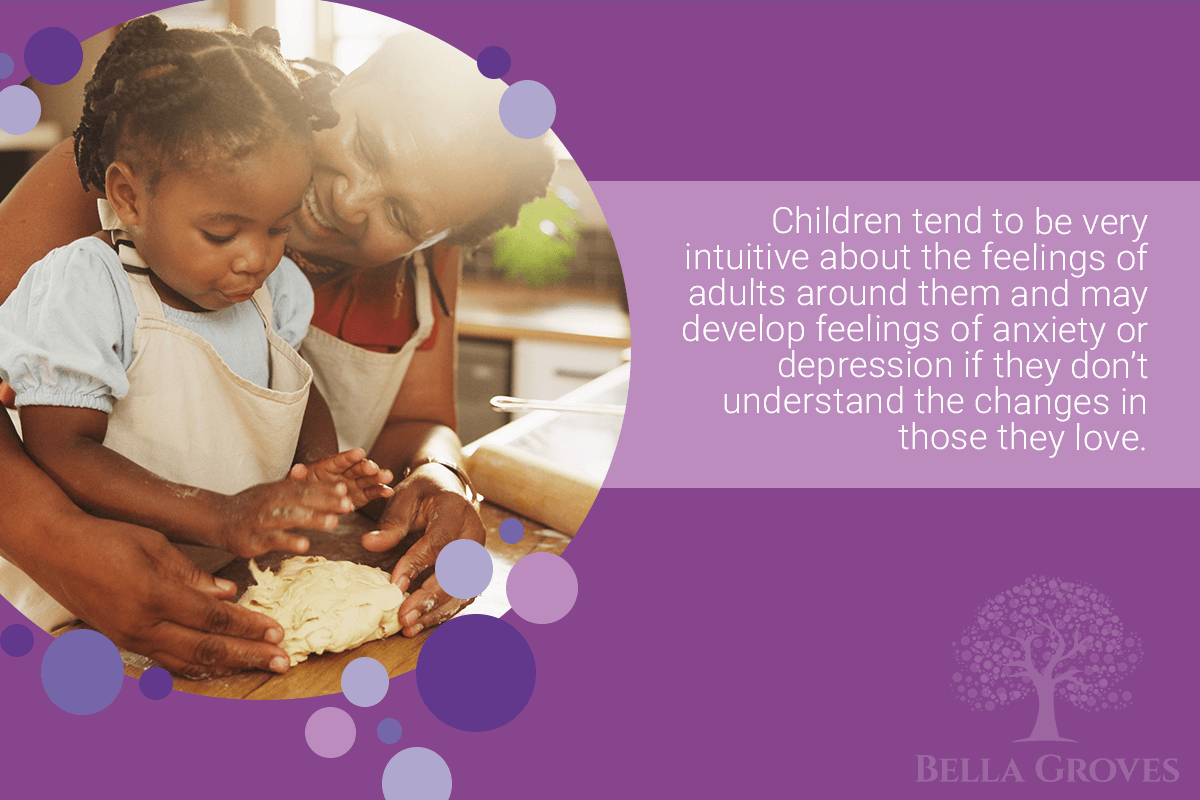
“Why is Grandma Acting Different?”: Explaining a Dementia Diagnosis to a Child
Receiving a dementia diagnosis is beyond overwhelming—almost immediately, you begin thinking about how to start planning for care, tend to your family member’s emotional needs, and, most importantly, about the future. For primary care partners, facing a loved one’s dementia diagnosis can seem as though you’re facing an upward battle alone. You might be so overwhelmed with everything going on that you forget about the children in the family.
It’s natural to want to protect children and adolescents from difficult situations, especially if your children are young, to keep them optimistic and innocent for as long as possible. However, children are often perceptive and may notice the tension and fear following a dementia diagnosis or other health concerns. As a result, they may start to ask questions like:
“Why does Grandpa never play ball with me anymore?”
“Why does Grandma act like she doesn’t know who I am?”
“Why does she have to move out of her house?”
Sitting down with children or other young family members and answering these questions honestly can provide comfort during a difficult time and let them know what to expect in the future.
Bella Groves wants to be here for you and your family every step of the way, not only offering full-time residential care to family members but also offering dementia resources and education about how to talk with children.
Explain Honestly and Appropriately
Many people believe that children are incapable of dealing with tough situations. Many young children have never had to go through loss or grief at this point in their lives, and you might be afraid that they won’t fully understand the situation.
Children are often more resilient than we give them credit for. They have the capacity to process and understand difficult emotions, and with the help of supportive adults, they can navigate challenging situations in a healthy manner. It’s important to provide them with age-appropriate information and support and to create an environment where they feel safe expressing their emotions and asking questions. By acknowledging their feelings and offering reassurance, we can help children build emotional resilience and cope with challenging circumstances.
It won’t help anyone to beat around the bush or try to sugar-coat the situation. You want to be honest and realistic about what is happening so that they can clearly understand. Using the correct terminology and language can make the words seem less intimidating when someone else says them.
“Your grandmother has something called Alzheimer’s disease. It is going to change the way she thinks and acts, but she is still the same person.”
Of course, it can be helpful to tailor your conversation based on the child’s age. For example, when talking to a child under ten, you might tell them that Grandma’s sickness is different from having a fever or an upset tummy. “Unfortunately, Grandma won’t get better, but the good news is that it’s not contagious, so you can give her all the hugs you want.”
If you’re talking to an older child or a teenager, you might explain that dementia affects the brain, slowly interfering with Grandma’s ability to remember, reason, and eventually communicate.
Above all else, remind your children (no matter what their age) that their feelings are completely normal. If they feel sad, confused, angry, or even scared, make sure they know that difficult emotions are natural and they can always come to you to talk without any judgment.
Encourage Questions
It’s crucial to foster an environment where children feel empowered to ask questions and know that there are no wrong ones. Encouraging their curiosity and being prepared with honest, age-appropriate responses can help provide comfort and education without resorting to false hope or dishonesty.
When dealing with sensitive topics, such as a loved one’s illness, it’s important to consider the impact of the information being shared. Just as you would expect a medical professional to communicate openly and honestly about a loved one’s condition, it’s essential to extend the same respect to your children. This kind of transparent communication can help them navigate and understand the situation more effectively.
Being honest with children about dementia diagnosis allows them to comprehend the reality of the situation and emotionally prepare themselves. It also helps to build trust and understanding within the family, ensuring that everyone is on the same page and able to support one another through challenging times.
Open and honest communication with children about a loved one’s condition can create an environment of trust, understanding, and support within the family. It enables children to process the situation in a healthy manner and fosters an environment where they feel safe to ask questions and seek comfort during difficult times. Here are some questions you might receive and some suggestions on how to answer them.
“Will Mom and Dad get sick, too?”
Most people who get sick like this are older, like Grandma’s age. Scientists don’t know exactly what causes dementia, but for right now, you don’t need to worry about Mom or Dad getting it.
“Is this why Grandpa calls me by my uncle’s name?”
Yes, this disease can make people confused and forget things, like people’s names or events. You might just remind him of your uncle! If he calls you the wrong name again, try not to correct him because this could make him even more confused or frustrated.
“I saw Grandma yelling at you the other day. Is she mad?”
Alzheimer’s disease causes changes in how people communicate, and sometimes they might lash out if they feel frustrated or unhappy. But your Grandma still loves me – and you – and was just having a bad day.”
“How should I act around Grandma now?”
Even though she may not be able to take you to get ice cream anymore, you can still spend time with her and be there for her. Show her you love her by painting her pictures, telling her stories, or simply sitting next to her on the couch. Her brain may change, but she will always be able to feel your love and appreciate your presence.
Plan Activities
Your child may fixate on the idea that their grandparent can no longer take them to the movies or play ball with them. While it’s natural and acceptable to mourn the loss of what their grandparent used to do, try to direct their attention to what their grandparent can still do.
Planning activities that they can enjoy together can be special and memorable for both the child and their grandparent. Some suggestions include:
- Baking cookies
- Painting or drawing a picture
- Taking a walk around the neighborhood
- Doing a jigsaw puzzle
- Looking at old family photos or make a scrapbook
- Reading a book
- Sharing favorite music
Sharing these small moments can reassure children that their grandparent is still the same person they love, even though they are sick. Making sure that they continue to have a strong connection can help children see beyond the illness, understanding that their grandparent’s personality, warmth, and love remain unchanged. These interactions can also provide comfort and joy, fostering a deeper bond despite the challenges that come with dementia.
Be There For Them. We’re There For You.
Explaining a dementia diagnosis to a child can be a challenging and emotional task for any family. It’s important to approach the situation with honesty and compassion. When speaking to a child about their grandparent or family member’s dementia, it’s crucial to answer their questions truthfully and be sensitive to their emotional needs.
Encourage them to learn more about the disease if they are interested, while letting them know that it’s okay to feel whatever emotions they may have. Reassure them that they are safe and supported, and that you are there for them no matter what. Your presence, whether through physical comfort or engaging activities, will help them feel loved and secure during this difficult time.
If your children show signs of depression or anxiety regarding your loved one’s condition, it’s important to consider finding a mental health professional who can further help your children cope with this difficult news. Children may have a hard time processing and understanding the illness of a loved one, and it’s crucial to provide them with the necessary support and resources to help them navigate through this challenging time.
Additionally, it can offer them another safe space to express their concerns and fears, while providing guidance on how to navigate the complex emotions that may arise. Taking proactive steps to address your children’s emotional well-being can be crucial in helping them cope with the impact of a dementia diagnosis.
We want to let you know that you are not forgotten or alone during this time, either. Dementia can be challenging, isolating, and overwhelming, but Bella Groves offers moments of peace and confidence. Our dementia education program and residential care services create feelings of unconditional joy for families in San Antonio impacted by dementia, including those children who might be confused about what’s going on with Grandma. Bella Groves is here for you – for all of you.
To discover our dementia resources, education, and community, we invite you to visit our website.
Updated November 2024

